73 F. high in the Twin Cities Wednesday. That’s the average high on May 27.
83 F. average high on July 1.
75 F. high on July 1, 2014.
July 1, 1964: Tyler picks up over 6 inches of rain in 24 hours.

A/C Optional
In the early 1800s did settlers at Fort Snelling complain about the heat & humidity? Probably. Maybe they took frequent dips in the lake or river to cool off. Somehow they made it work. Today most of us take air conditioning for granted.
There are exceptions.
My oldest son just moved into a new apartment in Seattle. He couldn’t get the A/C to turn on so he went to the front office, where they apparently stared at him like he had horns and a tail. “We don’t have A/C in this building. In Seattle A/C is optional.” Uh huh.
In the last week nearly 500 heat records have been set out west. London broiled near 100F yesterday. Record heat has killed thousands of people in India and Pakistan in recent weeks.
Then why does it feel more like early May than early July out there? The same stalled ridge of super-heated air over the west is setting the stage for west/northwest winds high above Minnesota, meaning frequent burps of cool air from that great air conditioner to the north, Canada. I think July will be much cooler than average.
The 4th of July looks sunny, dry and lake-worthy with highs in the 80s; in fact T-storms may hold off until Sunday night. 90s may be quite rare this summer in Minnesota.
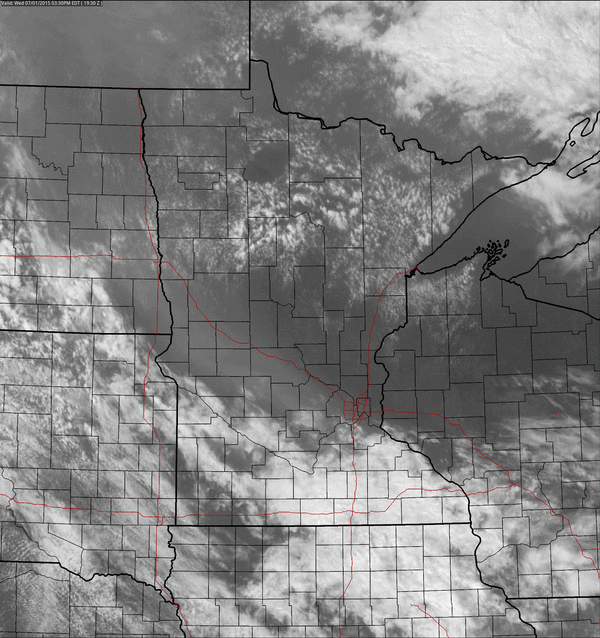
Clouds, Smoke and Cool Sunshine. Look carefully at the Wednesday afternoon visible satellite loop and you can see a plume of milky white (smoke) stretching from near Fargo to Willmar and Shakopee, the core of the plume extending all the way to Alaska. Morning clouds and light showers gave way to some comfortable sunshine later in the day. Considering we could easily be sizzling in the 90s no complaints. Loop: NOAA and AerisWeather.
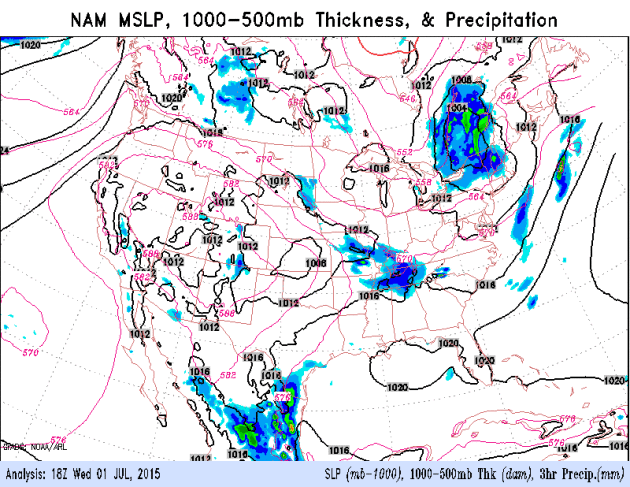
Mostly-Dry Into The 4th of July. Consider it a minor meteorological miracle – dry skies, reasonable humidity and light winds into Saturday with some sun each day as temperatures slowly mellow. Much of Sunday may be dry as well, with T-storms holding off until Sunday night. 84-hour NAM guidance: NOAA.
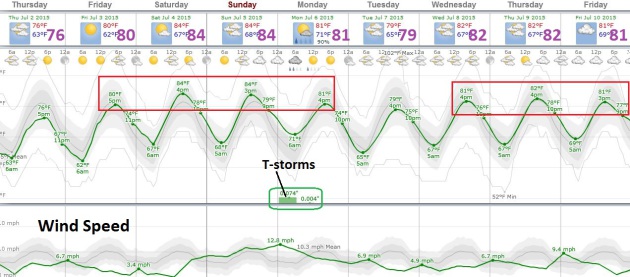
Slightly Cooler Than Average. No hot fronts, no chilly fronts – temperatures trend close to average in the coming days, but enough dry Canadian air is pushing south for nighttime temperatures to fall into the low and mid 60s, with a few exceptions, meaning no oppressive nighttime dew points. The best chance of T-storms: Sunday night into early Monday. Source: Weatherspark.
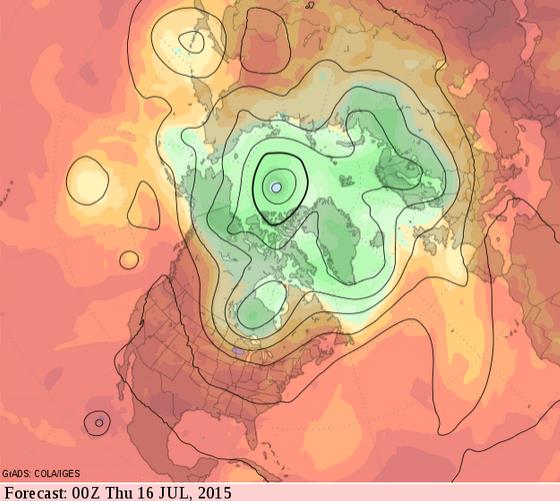
Hudson Bay Cut-Off Low in Mid-July? Predicted 500 mb winds (GFS) in mid-July show a head-scratchingly cool bubble of low pressure pinwheeling near Hudson Bay in 2 weeks, flinging a series of cooler, drier fronts south of the border, preventing Minnesota and the Great Lakes from overheating anytime soon. Heat lingers from the west coast into the deep south and Mid Atlantic states.
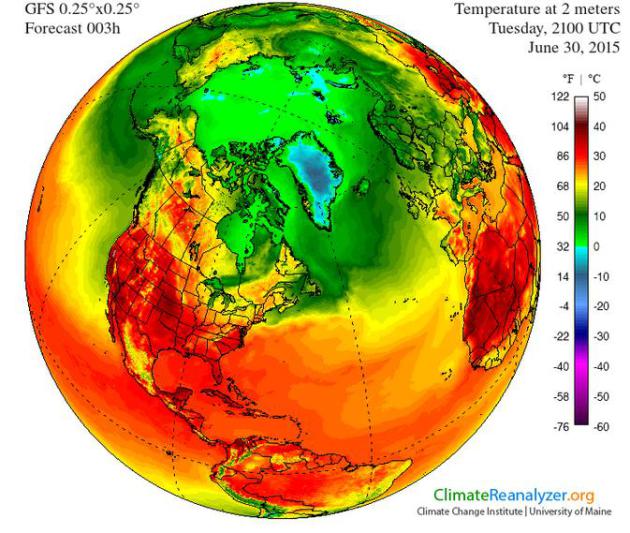
Unprecedented June Heat On Four Continents; Wimbledon Roasts in Record Heat. 98.1F in London yesterday? Jeff Masters at Weather Underground takes a look at scorching heat, now proving deadly – here’s an excerpt: “…We’ve already seen two of the planet’s top ten deadliest heat waves in history over the past two months; the Pakistani government announced on Wednesday that the death toll from the brutal June heat wave in Pakistan’s largest city, Karachi, had hit 1,250. According to statistics from EM-DAT, the International Disaster Database, this makes the 2015 heat wave in Pakistan the 8th deadliest in world history. The heat wave that hit India in May, claiming approximately 2,500 lives, ranks as the 5th deadliest...”
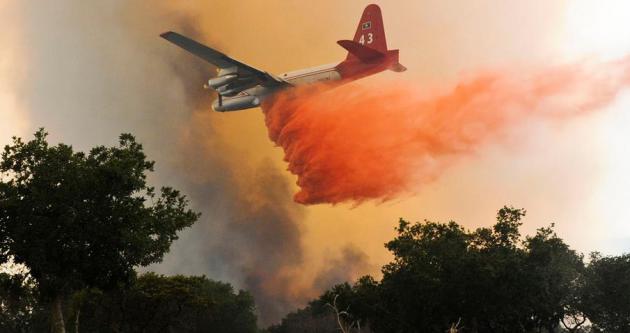
Heat Dome Parked Over West Shatters Temperature Records, Sets Fires. Andrew Freedman has a good overview at Mashable; here’s an excerpt: “The West is baking under a heat dome that has sent temperatures soaring to historically high levels, further drying out soils and priming the region for fast-spreading wildfires. The heat wave is noteworthy for its severity, extent and duration. During the past seven days alone, 465 warm temperature records have been set or tied across the country, mainly in the West, with 49 monthly warm temperature records set or tied, according to the National Center for Environmental Information in Asheville, North Carolina...”
Photo credit above: “A plane drops a load of retardant on a wildfire north of Lompoc, California, Monday, June 29, 2015.” Image: Len Wood/Lompoc Record via AP/Associated Press.
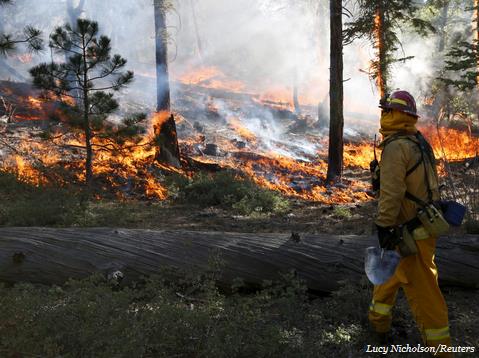
Wildfires Are Raging, And It’s About To Get A Whole Lot Worse. Business Insider has the story; here’s the introduction: “Summer just started but wildfires are already ravaging the dried-out West coast. Since the beginning of June, nearly 300 fires have burned in Alaska, with a total of 1.1 million acres already destroyed just one month into the fire season. Right now, a fire in the Galena Zone area of Alaska has burned through 100,000 acres…” (Photo: Lucy Nicholson, Reuters).
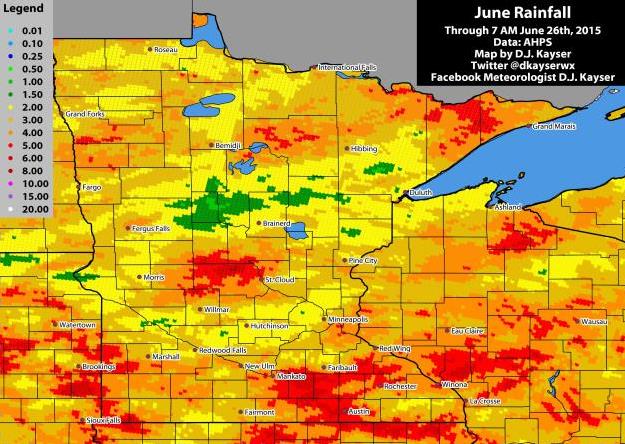
June Has Been Wet – Just Like Normal. No, this shouldn’t come as a shock, considering June is (historically) the wettest month of the year. Here’s an excerpt of a good post from AerisWeather meteorologist D.J. Kayser: “The rain bucket has been quite busy across the state again this month so far, with some areas of Minnesota picking up over 5″ of rain with only a few days left of June. So far, the top rain amount reported this month (through early on the 26th) was 8.00″ 0.3 miles SW of Ellendale by a CoCoRaHS observer. A COOP observer in Melrose has reported 7.65″ – and another COOP observer 3 miles southeast of Albert Lea has picked up 7.56″ so far. Any area in red above shows observed precipitation of 5″ or more through the month so far...”
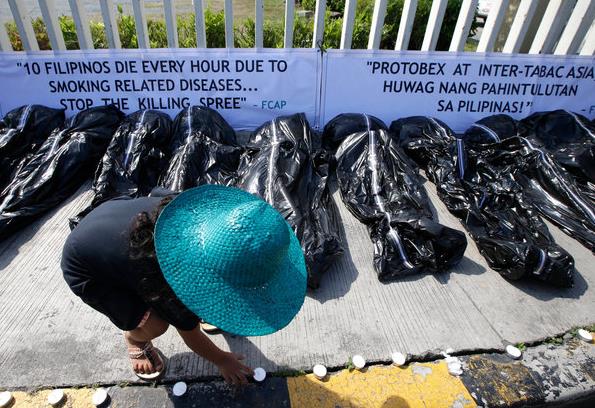
U.S. Chamber of Commerce Works Globally To Fight Antismoking Measures. I wonder what the local chapters of the Chamber of Commerce think about this? Here’s an excerpt from an infuriating story at The New York Times: “…From Ukraine to Uruguay, Moldova to the Philippines, the U.S. Chamber of Commerce and its foreign affiliates have become the hammer for the tobacco industry, engaging in a worldwide effort to fight antismoking laws of all kinds, according to interviews with government ministers, lobbyists, lawmakers and public health groups in Asia, Europe, Latin America and the United States…”
Photo credit above: “Protesters displayed fake body bags at a tobacco trade show at Pasay, the Philippines, in 2013.” Credit Bullit Marquez/Associated Press.

I Hate iTunes. And I Think Apple Does Too. I don’t look forward to synching my iDevices either – I have to agree that iTunes has become a bloated mess, not the typical, elegant, streamlined and simplified Apple Experience we’ve come to appreciate. Here’s an excerpt of a story at Quartz: “…Don’t blame my exhaustion on my friend’s lack of technological know-how or my own dwindling patience. Blame iTunes. Once the ultimate in music file management and the centerpiece to Apple’s financial turnaround, this program has evolved from a simple, dependable music player into the biggest example of bloatware in computers today. But why mince words? I hate iTunes. And I think Apple does, too…”

You Could Buy Your Own Personal Jetpack by 2017. Bingo. Santa, I only have one thing on my list. Here’s an excerpt from Quartz: “The future is nearly here. Jetpack maker Martin Aircraft has announced that its first jetpacks—aimed at first responders for use in search and rescue missions—will be ready for delivery in the second half of 2016, and that its “personal jetpacks” for the consumer market will be ready for use by the middle of 2017. The company’s P12 jetpack has a maximum speed of 74 kilometers per hour (46 miles per hour) and can rise up to 3,000 feet (900 meters)...” (Image credit: Martin Aircraft).
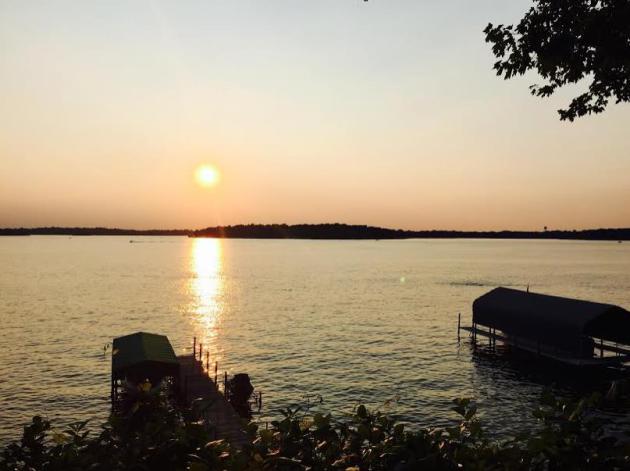
TODAY: Partly sunny and pleasant. Winds: SE 10. High: near 80
THURSDAY NIGHT: Clear and comfortable for early July. Low: 60 (50s in the ‘burbs)
FRIDAY: Sunny intervals, T-storm possible up north. High: 82
4TH OF JULY: Warm sun, few complaints. Winds: S 10+ Wake-up: 65. High: 84
SUNDAY: Sticky sun, T-storms rumble in at night. Winds: S 15-25. Wake-up: 68. High: 86
MONDAY: Showers taper, slow PM clearing. Wake-up: 69. High: 81
TUESDAY: Lukewarm sun, very nice. Wake-up: 64. High: 80
WEDNESDAY: Blue sky, average temperatures. Wake-up: 63. High: 82
Climate Stories…

More Evidence That Global Warming Is Intensifying Extreme Weather. Here’s an excerpt of an article at The Guardian from St. Thomas professor and climate scientist John Abraham: “…They separated changes in circulation from changes in thermodynamic effects. What they found is that most regions have seen increases in summertime warm temperatures in the past three decades. Furthermore, they found that in some regions, a large part of this trend is due to the increases in anticyclonic circulation and atmospheric blocking. The blocking that has been associated with extreme swings of weather (bringing very warm weather to the Western USA and simultaneous cold weather to the east for instance)...”
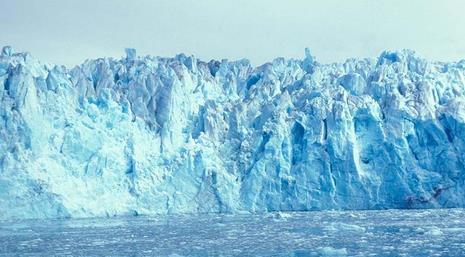
Alaska Glaciers Melting Faster As Planet Overheats. Here’s an excerpt from rtcc.org: “…He and his colleagues calculated that Alaska is losing ice at the rate of 75 billion metric tons a year. Such research is just one more piece of careful cross-checking in the great mosaic of climate research: another systematic confirmation that overall, glaciers are not losing ice in response to some natural cycle of change of the kind that occasionally confuses the picture for climate science. The agency at work is largely global warming as a response to the steady rise in atmospheric carbon dioxide as a consequence of the burning of fossil fuels...”
Photo credit above: “Alaska’s Columbia glacier is almost 20 kms shorter than it was in 1980.” (Wikimedia Commons/ US Fish and Wildlife Service).
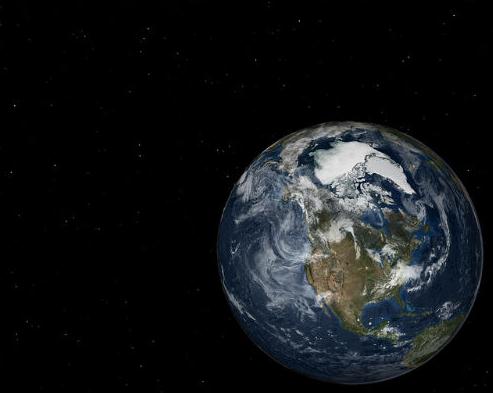
Love Thy Planet: Pope Francis’ Bully Pulpit On Climate Change. Here’s an excerpt of an Op-Ed from the Editorial Board at The Pittsburgh Gazette: “…Even to the pope’s supporters, his attacks on capitalism may seem excessive. His observations on technology and social organization sometimes are reminiscent of Cold War-era doomsday prophecy. But no one should expect Pope Francis, or any other individual, to have all the answers. With this encyclical, he has brought greater attention to the danger that global warming poses to humanity and called on people to respect and sustain the planet they share.”

Zero Carbon Emissions: The New Language of Climate Change. Here’s an excerpt from DeSmogBlog: “…In future, people will look back and question why we burned such precious resources so wastefully. Fossil fuels are solar energy, concentrated over millennia and useful for numerous applications, many of which we probably haven’t even discovered. Yet we’ve burned them largely so people, often solo drivers, can move around in tonnes of metal and plastic on land-destroying and expensive infrastructure. And we’ve used them to create increasing amounts of plastic packaging and unnecessary products that are now choking our oceans and land. Moving toward zero carbon emissions — in a much shorter timeline than agreed upon by Canada, France, Germany, Italy, Japan, the United Kingdom and the United States — is absolutely necessary, and not just for the climate. Eliminating fossil fuel energy will cut dangerous pollution, create new economic opportunities and ensure resources are available for wiser applications...”
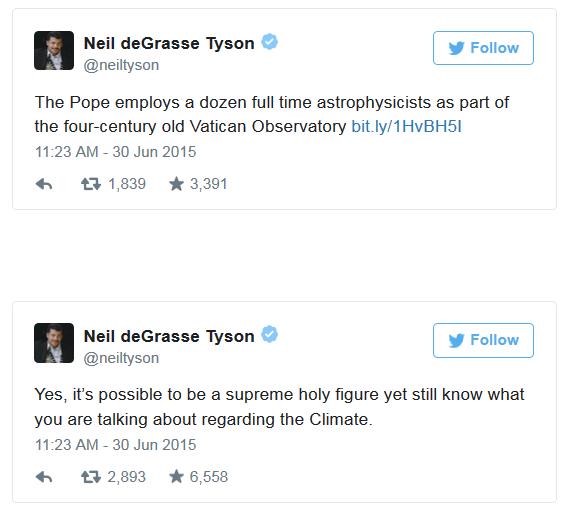
Neil deGrasse Tyson’s Message To People Who Think Pope Francis Shouldn’t Talk About Climate Change. Here’s a snippet from ThinkProgress: “...On Tuesday, the author and host of the late-night talk show StarTalk tweeted that despite being a religious figure, Pope Francis is more than qualified to talk about scientific issues. In a series of tweets, Tyson noted that the Vatican Observatory employs dozens of scientists who inform the pope on issues like climate change. “Yes, it’s possible to be a supreme holy figure yet still know what you are talking about regarding the Climate,” he tweeted...”
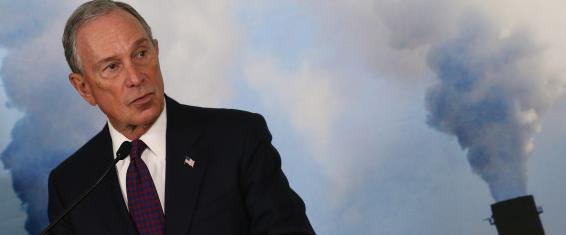
Why Cities Will Be Vital Players at Paris Climate Talks. Here’s an excerpt of a post from the Mayor of Paris, courtesy of Huffington Post: “…In cities and local regions across the globe, tackling climate change is also an opportunity for raising standards of living and improving jobs markets. Better mass transit means easier commutes. Reducing air pollution means improved public health. Developing parks and other new urban green spaces does not just offset carbon but attracts businesses, fosters employment and improves wellbeing. It is also a major social issue: energy-efficient buildings don’t just cut emissions, they lower power bills too…”
The agency at work is largely global warming as a response to the steady rise in atmospheric carbon dioxide as a consequence of the burning of fossil fuels.
– See more at: http://www.rtcc.org/2015/06/30/alaska-glaciers-melting-faster-as-planet-overheats/#sthash.xeKlw1gL.dpuf
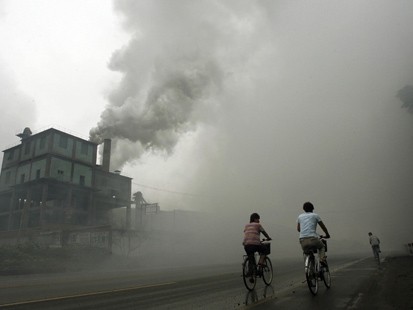
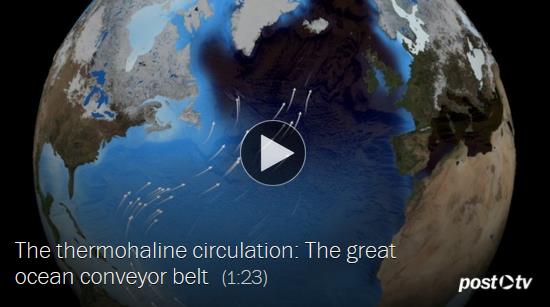
Melting Arctic Sea Ice Could Be Disrupting The Oceans’ Circulation – With Major Consequences. It turns out we’re conducting an experiment on the atmosphere, and the oceans. Here’s an excerpt from The Washington Post: “…A weakened Atlantic overturning circulation has the potential to cause some unexpected consequences. If the current slows down and less warm water gets transported north, then less heat will be transferred in regions such as Western Europe. According to Moore, Europe could actually experience a cooling effect in the future as a result of this — although how pronounced this cooling will be remains unclear. Climate change is expected to continue raising temperatures across the globe, so overturning-related cooling effects in Europe will likely be offset by global warming. It may be that Europe will continue to heat up, but at a slower pace than the rest of the world….”
Image credit above: “This NASA animation shows what happens globally to create the large, slow current called the thermohaline circulation.” (NASA).
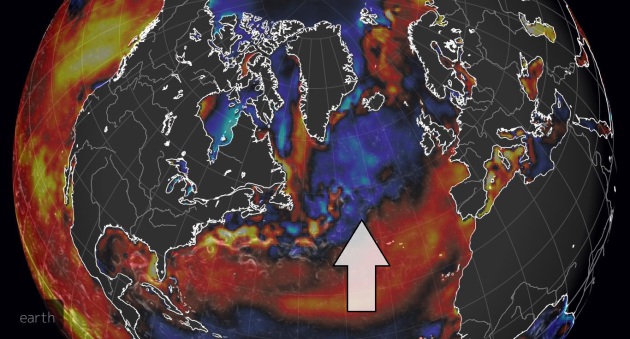
European Climate At Mercy of Retreating Sea Ice. Following up on the research above here’s additional perspective from Gizmag: “An international team of scientists has found that retreating sea ice between the Atlantic and Arctic Oceans is linked to weakened air-sea heat exchange in the region. This, it warns, could result in a cooler climate in western Europe and an altered or slower Atlantic Meridional Overturning Circulation (AMOC), which would have knock-on effects for the Gulf Stream and consequently for the atmosphere...” (Image credit here).

